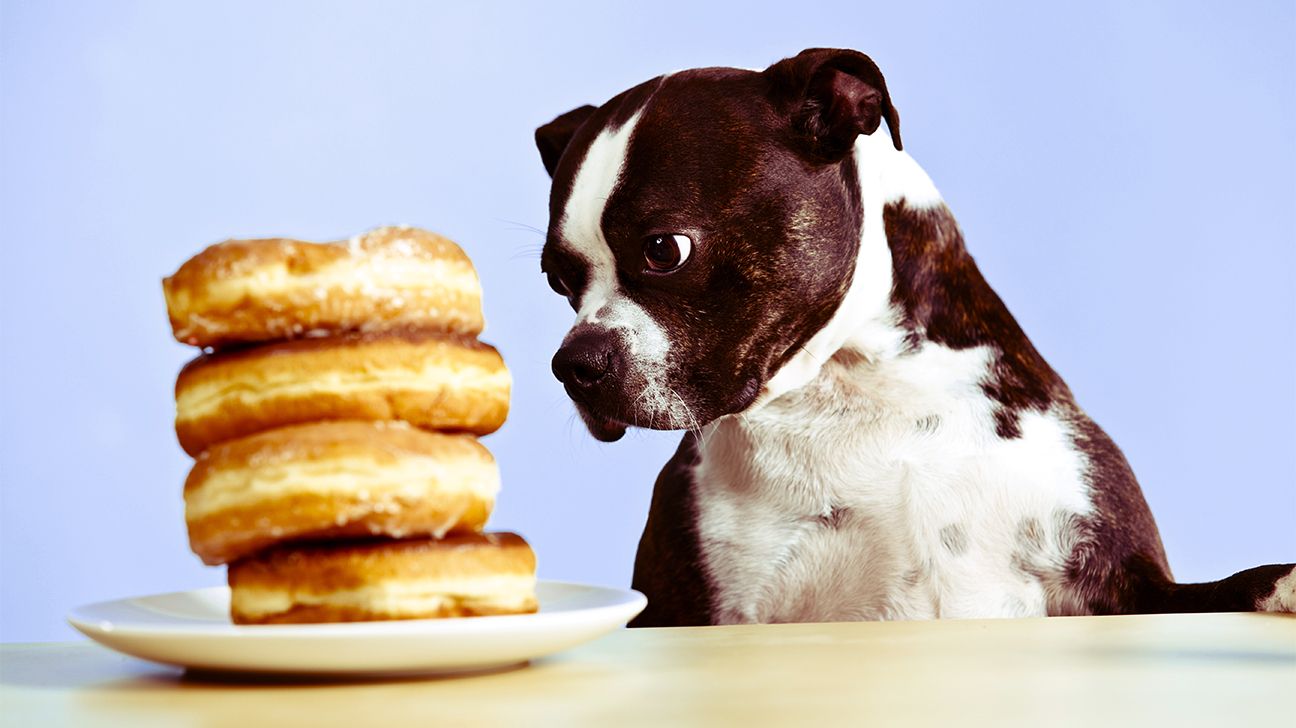Look, we’ve *all* fed Fido a little something off our plates once or twice.
After all, dogs are people too… except when they’re not. Unfortunately, lots of “people foods” can make Mr. Floof-Face feel sick as a dog (🥁 ba dum tss! 🥁).
To pinpoint which scraps aren’t fit for furbabies, we talked to veterinary health expert Gary Richter, DVM. Keep scrolling for the scoop on toxic foods for dogs.

Chocolate can be deadly for dogs. Research suggests that misdirected choco-love accounts for 25 percent of acute toxic exposures in dogs.
It’s all thanks to a compound called theobromine. The darker the chocolate, the more theobromine it has. And the more theobromine your pup eats, the sicker they’ll get.
Think your pooch licked a Hershey’s bar? Don’t freak out just yet. The level of toxicity is related to:
- the amount ingested
- the type of chocolate (dark vs. milk)
- your dog’s size (small dog + large bag of M&M’s = a dangerous combo)
Xylitol, a common sugar substitute, is considered dangerous for dogs. It can lead to frighteningly low blood sugar, and even trigger seizures, within 10 to 60 minutes of ingestion.
This one’s a little trickier because xylitol crops up in oodles of sugar-free or low sugar people foods:
- candy
- chewing gum
- cookies
- puddings
- ice cream
- some low sugar peanut butter
Yeast dough is on the American Veterinary Medical Association’s list of household hazards. That’s because yeast continues to rise (and sometimes ferment) in the stomach.
If you’re baking up bread, rolls, or yeasty desserts, keep that dough away from Princess! If the ingested dough keeps rising in your pup’s tiny tummy, it could cause all kinds of intestinal issues.
Leave the grapes and raisins for your cheese platter, and do your best to make sure your guests don’t drop any on the floor.
They seem so innocent, but grapes are exceptionally dangerous for dogs — ingestion can cause kidney failure and, in some cases, even death.
Think your pup sneaked a grape, raisin, or sip of grape juice? Call the vet ASAP if you notice these symptoms:
- vomiting
- diarrhea
- loss of appetite
- lethargy
- majorly bad breath
- mouth ulcers
- tremors or seizures
The Humane Society is clear that mushrooms are a no-no for your pooch. That’s particularly true of wild mushrooms. Your dog might be the goodest, but that doesn’t mean they’re always smart enough to know a poisonous ’shroom from a portobello.
Signs of mushroom poisoning:
- vomiting
- diarrhea
- excess drool
- weakness
Though *some* mushrooms might be OK for dogs, experts say it’s best to just keep them all away from your pup. Better safe than sorry.
Another treat on the Humane Society’s no-go list: black walnuts.
A 2016 study on foods toxic to dogs suggests that even noshing on walnut shells or walnut bark could make your pup super sick.
According to Richter, macadamia nuts can be toxic to dogs. A popular ingredient in cookies and other baked goods, these nuts cause vomiting, tremors, and elevated body temperature in pups.
Keep your pupperino safe by opting for unsalted peanuts instead — but only as a small, once-in-a-while treat. According to the American Kennel Club, because peanuts and cashews are high in fat, pups shouldn’t eat them often or in large amounts.
This might sound like a random combination, but they’ve all got something in common: They’re related plants (from the genus Allium) that aren’t good for Bark Ruffalo.
Richter explains that onions, garlic, leeks, and chives contain organosulfides that can upset your doggo’s tummy. A small study from back in 2000 (so old it can legally drink!) suggests that these plants can also damage dogs’ red blood cells.
Eating a heaping helping of fatty food — hello, turkey skin! — is a known cause of canine pancreatitis. This can lead to severe diarrhea, vomiting, dehydration, and eventual shock.
And then there are the bones. Richter says cooked turkey bones can splinter into fragments in your pup’s digestive tract, causing a variety of problems, including blocked or perforated intestines.
Richter says wayward caffeine from spilled coffee beans, caffeinated drinks, or caffeinated foods (again with the chocolate!) is no good for your pooch.
Pets are super sensitive to the effects of caffeine. Ingesting even a little can make dogs vulnerable to caffeine poisoning. The signs:
- hyperactivity
- panting
- elevated heart rate
- collapse
Seek immediate veterinary care if your pup develops these symptoms.
Yep, we’ve seen those IG reels where people offer their pup a sip of IPA. Not cute.
Alcohol is bad for dogs for pretty obvious reasons. Though keeping your dog away from the bottle is pretty easy, Richter says it’s also important to remember that some foods contain alcoholic properties:
- yeast dough
- some rich sauces
- baked goods soaked in rum or other hard liquor
- vanilla extract
If you notice your dog is staggering, seems confused, or has started vomiting, call your veterinarian. These are all signs of alcohol poisoning.
The takeaway
- Some people-friendly drinks and foods are toxic for dogs.
- The negative effects you notice from caffeine and alcohol will be even more pronounced in your pup’s little body.
- If your dog starts vomiting or acting strangely after eating *any* human food scraps, call your veterinarian ASAP.
- Consider loving on your doggo with new toys, canine treats, and cuddles instead of last night’s leftovers.

